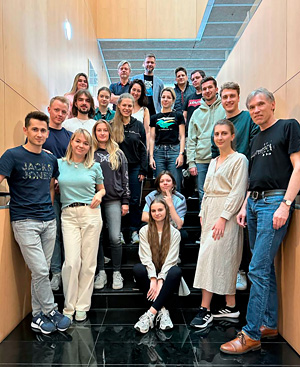VRScan3D Project
An international team of students performs real 3D scans of the interior of the School of Engineering in Geodesy, Cartography and Surveying of the UPV
[ 14/11/2023 ]
An international team of students has carried out practical training at the Universitat Politècnica de València (UPV) using a terrestrial laser scanner simulation programme of virtual reality developed within the framework of the VRScan3D project.
The group, made up of three students from the Kyiv University of Architecture and Civil Engineering (KNUCA), three students from the Dnipro Technical University (DNTU) - in the case of both Ukrainian universities, six women, due to the existing restrictions on men leaving the country during the war, three students from the University of Bamberg, three students from the Jade University of Applied Sciences and two students from the UPV, is led by a lecturer from each of these universities and two Ukrainian researchers, Iuliia Horkovchuk and Denys Gorkovchuk, KNUCA lecturers currently employed by the UPV and the organisers of this workshop held at the UPV's Cartographic Engineering, Geodesy and Photogrammetry Department, and funded by the German Academic Exchange Service.
During the workshop, the students used the VRScan laser scanner simulation software to perform real 3D scans of the interior of the building of the School of Engineering in Geodesy, Cartography and Surveying of the UPV in 4 different teams.
Professional growth and establishment of international synergies
"The overall aim of the project," explains Dr Horkovchuk, "was to test in practice a training tool, the VRscan3D terrestrial laser scanner simulator, for the training of surveyors. The students had the opportunity to practice the skills acquired through virtual reality in real life by surveying the School of Engineering in Geodesy, Cartography and Surveying buildings with real equipment.
"After completing all stages of the training," adds the KNUCA and UPV Research, "we received detailed feedback from the students about working with the VRScan3D software and their impressions of the group work. The project approach and the teamwork contribute to raising the professional level and building international relations, which is particularly valuable nowadays. The opportunity to gain experience in applied work is significant for students from Ukraine who are forced to study in the context of an active military conflict".
Kateryna Terebeichyk, a KNUCA student participating in the project, said, "I am very grateful to everyone for the opportunity. This project week in Valencia has been great; it is definitely one of the most educational and exciting events of this term. We have been working in groups of three people from different countries, and it's also a great advantage to gain experience with laser scanning, as we don't have such equipment at the university in Ukraine. We could work thoroughly with a terrestrial laser scanner and the first steps of data post-processing: joining and registering a point cloud. Obviously, learning in virtual reality has entailed some difficulties, but it has been an exciting experience for which I am very grateful".
Outstanding news
 Study a degree at the best technological university in Spain
Study a degree at the best technological university in Spain
The Universitat Politècnica de València is ranked number 1 among Spanish technology universities, according to the Shanghai ranking
 National Research Award
National Research Award
Ramón Martínez Máñez has received the "Juan de la Cierva" National Research Award in the area of Knowledge Transfer
 The UPV and Beihang University strengthen their academic and scientific alliance
The UPV and Beihang University strengthen their academic and scientific alliance
The two universities have signed a new collaboration agreement as part of the celebration of "UPV Day" in China
 Study in English
Study in English
The UPV offers eight degrees, 16 master's and 650 courses in English for the 2025-26 academic year
 THE Impact Ranking
THE Impact Ranking
The UPV, the Spanish university with the greatest social and economic impact in the world






